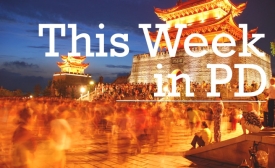japan
On his America tour, he makes the case for the democratic alternative to China’s influence in East Asia. By any measure, Japanese Prime Minister Shinzo Abe’s visit to the United States has been a resounding success. Having just wrapped up three full days in Washington, D.C., Abe is now in California, visiting both San Francisco and Los Angeles. Before Washington, he stopped in Boston and New York, making this the longest visit by a Japanese leader in decades.
The selection of a gown for a state dinner is always a matter of sartorial politics, cultural exchange and U.S. Chamber of Commerce-style marketing... It was also a beautiful example of fashion diplomacy.
The White House is keen to capitalize on Abe`s desire to put Japan back at the center of power in Asia, as China flexes its political and economic muscle. In the Oval Office Obama and Abe will discuss trade and are expected to hail progress toward a Trans-Pacific Partnership that brings together 12 countries -- including Japan and the United States.
Abe’s visit comes at an important time for U.S.-Japanese relations.
Japan's Prime Minister, Shinzo Abe, is in the U.S. this week for a tightly packed visit that will focus largely on the strong ties between the U.S. and its closest Asian ally. (...)This visit should help with the latter goal as Abe will have a summit with Obama and a state dinner at the White House with 300 guests. Image is important to the Abe administration, and it'll be on display during this U.S. visit, says Shihoko Goto, an Asia specialist with the Woodrow Wilson Center.
The lecture at UNAM was packed with about 500 students, with many people standing. Around the end of the lecture, I invited Hitomi to the stage and with her spoke to the audience about why maid cafes have become one of the icons of Japan’s pop culture and why they attract foreign visitors.In a nutshell, these cafes seriously entertain their customers by providing them with an experience which is completely different from their daily lives.

Can China's attempts at asserting its influence globally solidify its world power status?
While commemorating the 1955 Bandung Conference, China and Japan lay out competing visions for Asia and Africa.(...) While Japan and China’s strategies for Asian-African cooperation sound similar, in practice the potential for the two countries to collaborate is slim. China will pursue engagement with both Asia and Africa through the framework of its “One Belt, One Road” strategy, and Japan is hardly going to link its own outreach programs to a Chinese-led initiative.







